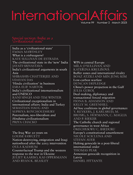
Civilizational exceptionalism in international affairs: making sense of Indian and Turkish claims
Haug, Sebastian / Supriya RoychoudhuryExterne Publikationen (2023)
in: International Affairs 99 (2), 531–549
DOI: https://doi.org/10.1093/ia/iiac317
Open access
Claims to civilizational exceptionalism have long been part of how states manoeuvre international affairs. While scholarly attention has started to move beyond the civilizational claims of western powers by engaging with those of states beyond the West, few accounts provide in-depth examinations of specific cases or bring these into dialogue with one another. This article offers a comparative analysis of how and why India and Turkey are positioning themselves as civilizational forces in global forums and international cooperation initiatives. Under the Narendra Modi regime, civilizational framings in India have found expression in the seemingly benign discourse of Hindu internationalism. In Turkey, successive governments under Recep Tayyip Erdoğan have linked their engagement abroad to the legacies of the Ottoman Empire. While there are clear differences in their respective civilizational antecedents, both countries draw on a combination of moral superiority and responsibility—India as vishwaguru (the world's guru) and Turkey as dünyanın vicdanı (the world's conscience)—as the legitimizing base for their assumed (normative) exceptionalism on the international stage. Overall, we argue that Indian and Turkish claims to civilizational exceptionalism serve two distinct but interrelated political projects: attempts to overcome centuries-long international marginalization, and efforts to buttress competitive authoritarianism domestically.

